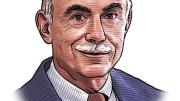As times change, so does traditional Harvard: the small, parochial school for ministers transformed over time into an international university. According to the Center for Education Statistics, more than two-fifths of students in higher education today are nontraditional, part-time adult students. Great growth is anticipated by all the Harvard schools among continuing and executive nontraditional students, and in 2036, the majority of students enrolled at the University will most likely be nontraditional, constituting five or more times the number of traditional residential students in the College and the professional graduate schools.
As our society ages and people live longer and more active lives in retirement, Harvard will respond to these trends by accommodating its graduates in programs like the Institute for Learning in Retirement, whereby seniors return to the academy after pursuing their careers to engage in peer teaching and learning.
Faculty members over time will erode the artificial boundaries of departments and divisions and schools in evidence today and create greater synergies through interdepartmental and interfaculty collaboration in research and teaching, at both the undergraduate and graduate levels. For example, since the spring of 2008, professor of the practice of molecular and cellular biology Robert Lue and professor of medicine Thomas Michel have co-taught simultaneously, from their respective classrooms in Cambridge and Boston, the first cross-faculty course offered both in class and online, “Cellular Metabolism and Human Disease,” a precedent that will engender many more such collaborations.
There will be a major shift in instruction from the classic large-lecture format to an asynchronous electronic format that can be accessed by students on their computers on campus and globally through online distance education. The shift will be to more electronic and modular instruction in many fields, as faculty members exploit new education technologies. Harvard Summer School, for example, just went global with a distance course, “Social Development in Pakistan,” that linked local summer students with Pakistani students through real-time video conferencing between Cambridge and Islamabad.
When we view Harvard at its 400th anniversary, we will witness a vastly changed but still familiar institution, an international multiversity that retains its reputation as the world’s premier center of teaching and learning for its many constituents. Hundreds of thousands of students from around the world who attend Harvard, both on campus and online, will regard themselves as part of the University’s extended family of alumni, enhancing Harvard’s global leadership role significantly.
Michael Shinagel, Ph.D. ’64, is dean of Continuing Education and University Extension and a senior lecturer on English.









